Palm Sunday of the Lord's Passion
Commemoration of the Lord's Entrance into Jerusalem
April 13, 2014 Cycle A
Purple priestly vestments symbolize penance and preparation.
Home Page
Liturgical
Year Cycle A 13-14
The Procession
Entrance Song
Matthew 21:9 Hosanna to the Son of David, the King of Israel.
Blessed is he who comes in the name of the Lord. Hosanna in the highest.
Priest:
In the name of the Father, and of the Son, and of the Holy Spirit.
All:
Amen.
Priest: The
grace of our Lord Jesus Christ, and the love of God, and the communion of the
Holy Spirit be with you all. you.
All:
And with your spirit.
Priest: Dear brothers and sisters, since the beginning of
Lent until now we have prepared our hearts by penance and charitable works.
Today we gather together to herald with the whole Church the beginning of the
celebration of our Lord's Paschal Mystery, that is to say, of his Passion and
Resurrection. For it was to accomplish this Mystery that he entered his
own city of Jerusalem. Therefore, with all faith and devotion, let us
commemorate the Lord's entry into the city for our salvation, following in his
foot steps, so that, being made by his grace partakers of the Cross, we may have
a share also in his Resurrection and in his life.
Priest: Let us pray.
Almighty ever-living God, sanctify these branches with your blessing, that we,
who follow Christ the King in exultation, may reach the eternal Jerusalem
through him. Who lives and reigns for ever and ever.
All: Amen.
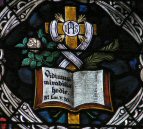 The Gospel:
The Liturgy of the Word is completed
by the reading of the Gospel. Before its reading, the members of the
assembly trace the sign of the cross upon the forehead to indicate their mental
acceptance of the Truth, on the lips to indicate their readiness to announce it,
and over the heart to indicate their sincere desire to accept it into their
lives. The "Good News" of the Gospel tells that God's kingdom has come for
all to hear, accept, and announce to the world for its salvation. It
is God who is speaking to us. Christ comes to teach us by the example of
His life and by His own words.
The Gospel:
The Liturgy of the Word is completed
by the reading of the Gospel. Before its reading, the members of the
assembly trace the sign of the cross upon the forehead to indicate their mental
acceptance of the Truth, on the lips to indicate their readiness to announce it,
and over the heart to indicate their sincere desire to accept it into their
lives. The "Good News" of the Gospel tells that God's kingdom has come for
all to hear, accept, and announce to the world for its salvation. It
is God who is speaking to us. Christ comes to teach us by the example of
His life and by His own words.
Priest: Cleanse my heart and my lips, almighty God, that I may worthily proclaim your
holy Gospel. Through the words of the Gospel may our sins be wiped away.
Priest: The Lord be with you.
All: And
also with you.
Priest/Deacon: A
reading from the holy Gospel according
to Matthew.
All: Glory
to you, Lord.
The Gospel: Matthew 21:1-11
Matthew wrote to show that Christ
was the
Messiah and fulfilled the Jewish prophecies.

When
Jesus and the disciples drew near Jerusalem and came to Bethphage on the Mount
of Olives, Jesus sent two disciples, saying to them, Go into the village
opposite you, and immediately you will find an ass tethered, and a colt with
her. Untie them and bring them here to me. And if anyone should say anything
to you, reply, The master has need of them. Then he will send them at
once. This happened so that what had been spoken through the prophet might be
fulfilled: Say to daughter Zion, Behold, your king comes to you, meek and
riding on an ass, and on a colt, the foal of a beast of burden.
The disciples went and did
as Jesus had ordered them. They brought the ass and the colt and laid their
cloaks over them, and he sat upon them. The very large crowd spread their
cloaks on the road, while others cut branches from the trees and strewed them on
the road. The crowds preceding him and those following kept crying out and
saying: Hosanna to the Son of David; blessed is he who comes in the name of
the Lord; hosanna in the highest.
And when he entered
Jerusalem the whole city was shaken and asked, Who is this? And the crowds
replied, This is Jesus the prophet, from Nazareth in Galilee.
Priest: Dear
brothers and sisters, like the crowds who acclaimed Jesus in Jerusalem, let us
go forth in peace.
The Procession begins
Psalm (Antiphon)
The children of the Hebrews, carrying
olive branches, went to meet the Lord, crying out and saying: Hosanna in the
highest.
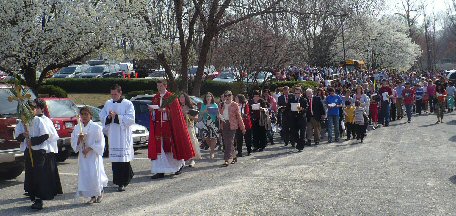
Psalm 24
Reader: The Lord's is the earth
and its fullness, the world, and those who dwell in it. It is he who set
it on the seas; on the rivers he made it firm.
ALL: The children of
the Hebrews, carrying olive branches, went to meet the Lord, crying out and
saying: Hosanna in the highest.
Reader: Who shall
climb the mountain of the Lord? The clean of hands and pure of heart,
whose soul is not set on vain things, who has not sworn deceitful words.
ALL: The children of
the Hebrews, carrying olive branches, went to meet the Lord, crying out and
saying: Hosanna in the highest.
Reader: Blessings
from the Lord shall he receive, and right reward from the God who saves him.
Such are the people who seek him, who seek the face of the God of Jacob.
ALL: The children of
the Hebrews, carrying olive branches, went to meet the Lord, crying out and
saying: Hosanna in the highest.
Reader: O gates,
lift high your heads; grow higher, ancient doors. Let him enter, the king
of glory! Who is this king of glory? The Lord, the mighty, the
valiant; the Lord, the valiant in war.
ALL: The children of
the Hebrews, carrying olive branches, went to meet the Lord, crying out and
saying: Hosanna in the highest.
Reader: O gates,
lift high your heads; grow higher, ancient doors. Let him enter, the king
of glory! Who is this king of glory? He, the Lord of hosts, he is
the king of glory.
ALL: The children of
the Hebrews, carrying olive branches, went to meet the Lord, crying out and
saying: Hosanna in the highest.
Reader: As the Lord
entered the holy city, the children of the Hebrews proclaimed the resurrection
of life. Waving their branches of palm, they cried: Hosanna in the
highest.
ALL: When the
people heard that Jesus was coming to Jerusalem, they went out to meet him.
Waving their branches.
The Priest Approaches and Kisses the Altar:
The
altar is a symbol of Christ. In it are cut five crosses to recall the five
wounds of Christ. The altar also represents the Church and has embedded in
it the relics of her saints. The priest comes to the altar to celebrate
the Sacrifice in the Church's name. Because of the glory surrounding the
altar upon which the divine Sacrifice will be made, the kiss of the priest
unites the Church to Christ, its Redeemer.
The Collect: The
priest lifts the united prayers and petitions of the congregation to God the
Father through the merits of Jesus Christ in the Holy Spirit.
Priest: Let
us pray. Almighty ever-living God, who as an example of humility for the
human race to follow caused our Savior to take flesh and submit to the Cross,
graciously grant that we may heed his lesson of patient suffering and so merit a
share in his Resurrection. Who lives and reigns with you in the unity of
the Holy Spirit, one God, for ever and ever.
The Reading of Our Lord's Passion
According to Matthew 26:14-27:66
Narrator:
The Passion of our Lord Jesus Christ according to Matthew. One of the
Twelve, who was called Judas Iscariot, went to the chief priests and said,
Speaker: What are you willing to give me if I hand him over to you?
Narrator: They paid him thirty pieces of silver, and from
that time on he looked for an opportunity to hand him over. On the first day of
the Feast of Unleavened Bread, the disciples approached Jesus and said,
Speaker: Where do you want us to prepare for you to eat the Passover?
Narrator: He said,
Jesus: Go into the city to a certain man and tell him, The teacher
says, My appointed time draws near; in your house I shall celebrate the
Passover with my disciples.
Narrator: The disciples then did as Jesus had ordered, and
prepared the Passover. When it was evening, he reclined at table with the
Twelve. And while they were eating, he said,
Jesus: Amen, I say to you, one of you will betray
me.
Narrator: Deeply distressed at this, they began to say to him one
after another,
Speaker: Surely it is not I, Lord?
Narrator: He said in reply,
Jesus: He who has dipped his hand into the dish with
me is the one who will betray me. The Son of Man indeed goes, as it is written
of him, but woe to that man by whom the Son of Man is betrayed. It would be
better for that man if he had never been born.
Narrator: Then Judas, his betrayer, said in reply,
Speaker: Surely it is not I, Rabbi?
Narrator: He answered,
Jesus: You have said so.
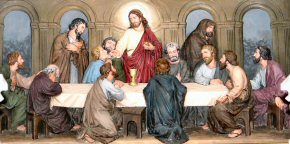 Narrator: While they were eating, Jesus took bread, said the
blessing, broke it, and giving it to his disciples said,
Narrator: While they were eating, Jesus took bread, said the
blessing, broke it, and giving it to his disciples said,
Jesus: Take and eat; this is my body.
Narrator: Then he took a cup,
gave thanks, an gave it to them, saying,
Jesus: Drink from it, all of you, for this is
my blood of the covenant, which will be shed on behalf of many for the
forgiveness of sins. I tell you from now on I shall not drink this fruit of the
vine until the day when I drink it with you new in the kingdom of my Father.
Narrator: Then, after singing a hymn, they went out to
the Mount of Olives. Then Jesus said to them,
Jesus: This night all of you will have your
faith in me shaken, for it is written: I will strike the shepherd, and the
sheep of the flock will be dispersed; but after I have been raise up, I
shall go before you to Galilee.
Narrator: Peter said to him in reply,
Speaker: Though all may have their faith in you shaken, mine will
never be.
Narrator: Jesus said to him,
Jesus: Amen, I say to you, this very
night before the cock crows, you will deny me three times.
Narrator: Peter said to him,
Speaker: Even though I should have to die with you, I will not
deny you.
Narrator: He took along Peter and the two sons of Zebedee,
and began to feel sorrow and distress. Then he said to them,
Jesus: My soul is sorrowful even to
death. Remain here and keep watch with me.
Narrator: He advanced a little and fell prostrate in
prayer, saying,
Jesus: My Father, if it is possible, let this
cup pass from me; yet, not as I will, but as you will.
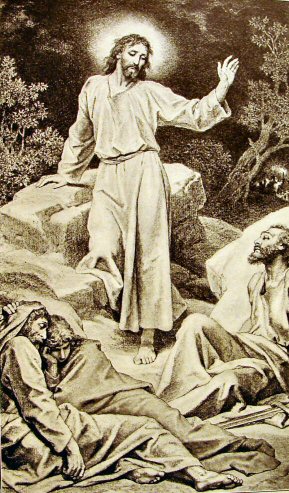 Narrator: When he returned to his disciples he found
them asleep. He said to Peter,
Narrator: When he returned to his disciples he found
them asleep. He said to Peter,
Jesus: So you could not keep watch with
me for one hour? Watch and pray that you may not undergo the test. The spirit
is willing, but the flesh is weak.
Narrator: Withdrawing a second time, he prayed again,
Jesus: My Father, if it is not possible
that this cup pass without my drinking it, your will be done!
Narrator: Then he returned once more and found them
asleep, for they could not keep their eyes open. He left them and withdrew
again and prayed a third time, saying the same thing again. The he returned to
his disciples and said to them,
Jesus: Are you still sleeping and taking
your rest? Behold, the hour is at hand when the Son of Man is to be handed over
to sinners. Get up, let us go. Look, my betrayer is at hand.
Narrator: While he was still speaking, Judas, one of
the Twelve, arrived, accompanied by a large crowd, with swords and clubs, who
had come from the chief priests and the elders of the people. His betrayer had
arranged a sign with them, saying,
Speaker: The man I shall kiss is the one; arrest him.
Narrator: Immediately
he went over to Jesus and said,
Speaker: Hail, Rabbi!
Narrator: and he kissed him. Jesus
answered him,
Jesus: Friend, do what you
have come for.
Narrator: Then stepping forward they laid hands on
Jesus and arrested him. And behold, one of those who accompanied Jesus put his
hand to his sword, drew it, and struck the high priests servant, cutting off
his ear. The Jesus said to him,
Jesus: Put your sword back
into its sheath, for all who take the sword will perish by the sword. D you
think that I cannot call upon my Father and he will not provide me at this
moment with more than twelve legions of angels? But then how would the
Scriptures be fulfilled which say that it must come to pass in this way?
Narrator: At that hour Jesus said to the
crowds,
Jesus: Have you come out as
against a robber, with swords and clubs to seize me? Did after day I sat
teaching in the temple area, yet you did not arrest me. But al this has come to
pass that the writings of the prophets may be fulfilled.
Narrator: Then all the disciples left him
and fled. Those who had arrested Jesus led him away to Caiaphas the high
priest, where the scribes and the elders were assembled. Peter was following
him at a distance as far as the high priests courtyard, and going inside he sat
down with the servants to see the outcome. The chief priests and the entire
Sanhedrin kept trying to obtain false testimony against Jesus in order to put
him to death, but they found none, though many false witnesses came forward.
Finally two came forward who stated,
Chorus: This man said, I can destroy the
temple of God and within three says rebuild it.
Narrator: The high priest rose and
addressed him,
Speaker: Have you no answer? What are these men
testifying against you?
Narrator: But Jesus was silent. Then the
high priest said to him,
Speaker: I order you to tell us under oath before the
living God whether you are the Christ, the Son of God.
Narrator: Jesus said to him in reply,
Jesus: You have said so. But I
tell you: From now on you will see the Son of Man seated at the right hand of
the Power and coming on the clouds of heaven.
Narrator: Then the high priest tore his
robes and said,
Speaker: He has blasphemed!
What further need have we of witnesses? You
have now heard the blasphemy; what is your opinion?
Narrator: They said in reply,
Chorus: He deserves to die!
Narrator: Then they spat in his face and
struck him, while some slapped him, saying,
Chorus: Prophesy for us, Christ; who is
it that struck you?
Narrator: Now Peter was sitting outside in
the courtyard. One of the maids came over to him and said,
Chorus: You too were with Jesus the
Galilean.
Narrator: But he denied it in front of
everyone, saying,
Speaker: I do not know what you are talking
about!
Narrator: As he went out to the gate,
another girl saw him and said to those who were there,
Chorus: This man was with Jesus the
Nazorean.
Narrator: Again he denied it with an oath,
Speaker: I do not know the man!
Narrator: A little later the bystanders
came over and said to Peter,
Chorus: Surely you too are one of them;
even your speech gives you away.
Narrator: At that he began to curse and to
swear,
Speaker: I do not know the man.
Narrator: And immediately a cock crowed.
Then Peter remembered the word that Jesus had spoken: Before the cock crows you
will deny me three times. He went out and began to weep bitterly. When it was
morning, all the chief priests and the elders of the people took counsel against
Jesus to put him to death. They bound him, led him away, and handed him over to
Pilate, the governor. Then Judas, his betrayer, seeing that Jesus had been
condemned, deeply regretted what he had done. He returned the thirty pieces of
silver to the chief priests and elders, saying,
Speaker: I have sinned in betraying innocent
blood.
Narrator: They said,
Chorus:
What is that to us? Look to it yourself.
Narrator: Flinging the money into the
temple, he departed and went off and hanged himself. The chief priests gathered
up the money, but said,
Chorus: It is not lawful to deposit this
in the temple treasury, for it is the price of blood.
Narrator: After consultation, they used it
to buy the potters field as a burial place for foreigners. That is why that
field even today is called the Field of Blood. Then was fulfilled what had
been said through Jeremiah the prophet, And they took the thirty pieces of
silver, the value of a man with a price on his head, a price set by some of the
Israelites, and they paid it out for the potters field just as the Lord had
commanded me.
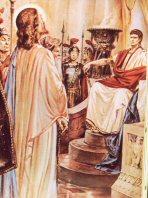 Narrator: Now Jesus stood before the
governor, and he questioned him,
Narrator: Now Jesus stood before the
governor, and he questioned him,
Speaker: Are you the king of the Jews?
Narrator: Jesus said,
Jesus: You say so.
Narrator: And when he was accused by the
chief priests and elders, he made no answer. Then Pilate said to him,
Speaker: Do you not hear how many things they are
testifying against you?
Narrator: But he did not answer him one word, so that the governor was greatly
amazed. Now on the occasion of the feast the governor was accustomed to release
to the crowd one prisoner whom they wished. And at that time they had a
notorious prisoner called Barabbas. So when they had assembled, Pilate said to
them,
Speaker: Which one do you want me to release to you,
Barabbas, or Jesus called Christ?
Narrator: For he knew that it was out of
envy that they had handed him over. While he was still seated on the bench, his
wife sent him a message, Have nothing to do with that righteous man. I
suffered much in a dream today because of him. The chief priests and the
elders persuaded the crowds to ask for Barabbas but to destroy Jesus. The
governor said to them in reply,
Speaker: Which of the two do you want me to release
to you?
Narrator: They answered,
Chorus: Barabbas!
Narrator: Pilate said to them,
Speaker: Then what shall I do with Jesus called
Christ?
Narrator: They all said,
Chorus: Let him be crucified!
Narrator: But he said,
Speaker:
Why? What evil has he done?
Chorus: Let him be crucified!
Narrator: When Pilate saw that he was not
succeeding at all, but that a riot was breaking out instead, he took water and
washed his hands in the sight of the crowd, saying,
Speaker: I am innocent of this mans blood. Look to
it yourselves.
Narrator: And the whole people said in
reply,
Chorus: His blood be upon us and upon our
children.
Narrator: Then he released Barabbas to them, but
after he had Jesus scourged, he handed him over to be crucified. Then the
soldiers of the governor took Jesus inside the Praetorium and gathered the whole
cohort around him. They stripped off his clothes and threw a scarlet military
cloak about him. Weaving a crown out of thorns, they placed it on his head, and
a reed in his right hand. And kneeling before him, they mocked him, saying,
Chorus: Hail, King of the Jews!
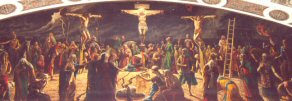 Narrator: They spat upon him and took the reed
ad kept striking him on the head. And when they had mocked him, they stripped
him of the cloak, dressed him in his own clothes, and led him off to crucify
him. As they were going out, they met a Cyrenian named Simon: this man they
pressed into service to carry his cross. And when they came to a place called
Golgotha which means Place of the Skull they gave Jesus wine to drink mixed
with gall. But when he had tasted it, he refused to drink. After they had
crucified him, they divided his garments bv casting lots; then they sat down and
kept watch over him there. And they placed over his head the written charge
against him: This is Jesus, the King of the Jews. Two revolutionaries were
crucified with him, one on his right and the other on his left. Those passing
by reviled him, shaking their heads and saying,
Narrator: They spat upon him and took the reed
ad kept striking him on the head. And when they had mocked him, they stripped
him of the cloak, dressed him in his own clothes, and led him off to crucify
him. As they were going out, they met a Cyrenian named Simon: this man they
pressed into service to carry his cross. And when they came to a place called
Golgotha which means Place of the Skull they gave Jesus wine to drink mixed
with gall. But when he had tasted it, he refused to drink. After they had
crucified him, they divided his garments bv casting lots; then they sat down and
kept watch over him there. And they placed over his head the written charge
against him: This is Jesus, the King of the Jews. Two revolutionaries were
crucified with him, one on his right and the other on his left. Those passing
by reviled him, shaking their heads and saying,
Chorus: You who would destroy the temple and
rebuild it in three days, save yourself, if you are the Son of God, and come
down from the cross!
Narrator: Likewise the chief priests with
the scribes and elders mocked him and said,
Chorus: He saved others; he cannot save
himself. So he is the king of Israel! Let him come down from the cross now,
and we will believe in him. He trusted in God; let him deliver his now if he
wants him. For he said, I am the Son of God.
narrator: The revolutionaries who were crucified with him also kept abusing him
in the same way. From noon onward, darkness came over the whole land until
three in the afternoon. And about three oclock Jesus cried out in a loud
voice,
Jesus: Eli, Eli, lema
sabachthani?
Narrator: Which means,
Jesus: My God, my God, why have you
forsaken me?
Narrator:
Some of the bystanders who heard it said,
Chorus: This one is calling for Elijah.
Narrator: Immediately one of them ran to
get a sponge; he soaked it in wine, and putting it on a reed, gave it to him to
drink. But the rest said,
Chorus: Wait, let us see if Elijah comes to
save him.
Narrator: But Jesus cried out again in a loud
voice, and gave up his spirit.
Here all kneel and pause for a short time.
Narrator: And behold, the veil of the sanctuary was
torn in two from top to bottom. The earth quaked, rocks were split, tombs were
opened, and the bodies of many saints who had fallen asleep were raised. And
coming forth from their tombs after his resurrection, they entered the holy city
and appeared to many. The centurion and the men with him who were keeping watch
over Jesus feared greatly when they saw the earthquake and all that was
happening, and they said,
Chorus: Truly, this was the Son of God!
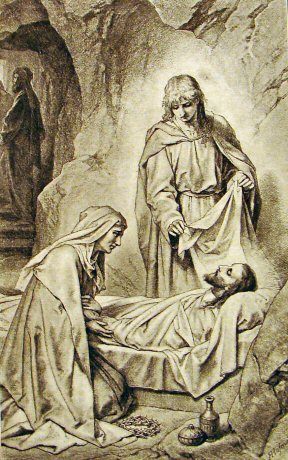 Narrator: There were many women there, looking
on from a distance, who had followed Jesus from Galilee, ministering to him.
Among them were Mary Magdalene and Mary the mother of James and Joseph, and the
mother of the sons of Zebedee. When it was evening, there came a rich man from
Arimathea named Joseph, who was himself a disciple of Jesus. He went to Pilate
and asked for the body of Jesus; then Pilate ordered it to be handed over.
Taking the body, Joseph wrapped it in clean linen and laid it in his new tomb
that he had hewn in the rock. Then he rolled a huge stone across the entrance
to the tomb and departed. But Mary Magdalene and the other Mary remained
sitting there, facing the tomb. The next day, the one following the day of
preparation, the chief priests and the Pharisees gathered before Pilate and
said,
Narrator: There were many women there, looking
on from a distance, who had followed Jesus from Galilee, ministering to him.
Among them were Mary Magdalene and Mary the mother of James and Joseph, and the
mother of the sons of Zebedee. When it was evening, there came a rich man from
Arimathea named Joseph, who was himself a disciple of Jesus. He went to Pilate
and asked for the body of Jesus; then Pilate ordered it to be handed over.
Taking the body, Joseph wrapped it in clean linen and laid it in his new tomb
that he had hewn in the rock. Then he rolled a huge stone across the entrance
to the tomb and departed. But Mary Magdalene and the other Mary remained
sitting there, facing the tomb. The next day, the one following the day of
preparation, the chief priests and the Pharisees gathered before Pilate and
said,
Chorus: Sir we remember that this
impostor while still alive said, After three days I will be raise up. Give
orders, then, that the grave be secured until the third day, lest his disciples
come and steal him and say to the people, He has been raised from the dead.
This last imposture would be worse than the first.
Narrator: Pilate said to them,
Speaker: The guard is yours; go, secure it as best
you can.
Narrator: So they went and secured the
tomb by fixing a seal to the stone and setting the guard.
The Priest's Sermon:
The priest develops, explains, and comments upon the Master's words,
so our minds may be
enlightened, and our
hearts enriched.
(A priestly reflection upon this Gospel)
Profession of Faith:
We state in the
Nicene Creed the principles of our faith in precise and definite terms.
All: I believe in one God, the Father, the Almighty,
maker of heaven and earth, of all that is seen and unseen. I believe in
one Lord, Jesus Christ, the Only Begotten Son of God, born of the Father before
all ages.
God from God, Light from Light, true God from true God, begotten, not made,
consubstantial with the Father; through him all things were made. For us
men and for our salvation he came down from heaven, and by the Holy
Spirit was incarnate of the Virgin Mary, and became man. For our sake he was
crucified under Pontius Pilate, he suffered death and was buried, and rose again
on the third day in accordance with the Scriptures. He ascended into
heaven and is seated at the right hand of the Father. He will come again
in glory to judge the living and the dead and his kingdom will have no end.
I believe in the Holy Spirit, the Lord, the giver of life, who proceeds from
the Father and the Son, who with the Father and the Son is adored and
glorified, who has spoken through the prophets. I believe in one,
holy, catholic and apostolic Church. I confess one Baptism for the
forgiveness of sins and I look for the resurrection of the dead and the
life of the world to come. Amen.
General Intercessions:
We pray for the needs of the pope, civic
leaders, our own needs, those of others,
the sick, the dying, those who have died, the church, and the world.
The response of all to each intercession: Lord, hear our prayer.
All: Lord,
hear our prayer.
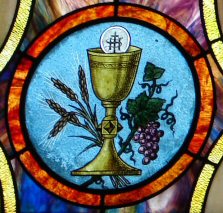 The Liturgy of the Eucharist
The Liturgy of the Eucharist
Gifts of bread and wine
symbolizing ourselves are presented to the priest who will offer them to God the
Father. Through the Holy Spirit, they will become the Body and Blood of
Jesus Christ whom we receive in Holy Communion. Jesus unites Himself with
us for our spiritual nourishment and strength. Today, when individuals do
not present their own personal offerings of bread and wine, the monetary contribution
symbolizes the material of their united sacrifice. The priest makes and
offering of the bread and wine to God.
Preparation of the Bread and
Wine:
Priest: Blessed are you, Lord God of all creation,
for through your goodness we have received the bread we offer you:
fruit of the earth and work of human hands, it will become for us the bread of
life.
All:
Blessed be God for ever.
Priest: By
the mystery of this water and wine may we come to share in the divinity of
Christ, who humbled himself to
share
in our humanity.
Priest: Blessed are you, Lord God of all creation, for through your goodness we have
received the wine we offer you; fruit
of the vine and work of human hands it will become our spiritual drink.
All: Blessed be God for ever.
Priest: With
humble spirit and contrite heart may we be accepted by you, O Lord, and may our
sacrifice in your sight this
day be pleasing to you, Lord God.
The Priest's Hands are Washed: This
act was traditionally necessary because the priest handled the various gifts
presented by the people. Now, the cleansing act using water reminds the
priest and ourselves of the need to cleanse not only the hands but the soul.
Soon, the priest's hands will hold the actual body of Christ, and we will become
His dwelling place.
Priest: Wash
me o Lord, from my iniquity and cleanse me from my sin.
Pray, brethren, that
my sacrifice and yours may be acceptable to God, the almighty Father.
All: May the Lord accept the sacrifice at your hands for the praise and glory of his
name, for our good and the good of
all his holy Church.
Prayer over the Gifts:
Speaking in our name, the priest asks
the Father to accept the gifts we offer through him.
Priest: Through the Passion of
your Only Begotten Son, O Lord, may our reconciliation with you be near at hand,
so that, though we do not merit it by our own deeds, yet by this sacrifice made
once for all, we may feel already the effects of your mercy. Through
Christ our Lord.
Eucharistic Prayer:
(Number Two: The priest may select from several forms).
Priest: The Lord be with you.
All: And
with your spirit.
Priest: Lift up your hearts.
All: We lift them up to the Lord.
Priest: Let us give thanks to the Lord, our God.
All: It is right to
give him thanks and praise.
Preface Prayer:
Priest: It is truly right and just, our duty and our salvation,
always and everywhere to give you thanks, Lord, holy Father, almighty and
eternal God, through Christ our Lord. For, though innocent, he suffered
willingly for sinners and accepted unjust condemnation to save the guilty.
His Death has washed away our sins, and his Resurrection has purchased our
justification. And so, with all the Angels, we praise you, as in joyful
celebration we acclaim:
Acclamation:
Priest
and All:
Holy, Holy, Holy Lord, God of power and might, Heaven and
earth are full of your glory. Hosanna in the
highest. Blessed
is he who comes
in the name of the Lord. Hosanna in the highest.
Priest: Lord, you are holy indeed, the fountain of all
holiness. Let your Spirit come upon these gifts to make them holy, so that
they may become for us the body and blood of our Lord, Jesus Christ.
The priest repeats the words which
Christ used at his Last Supper when He changed the bread into His Body and the
wine into His Blood. His Body and Blood are truly present but under the
appearance of bread and wine. The death of Christ is prolonged in each of
those who receive Him worthily. We apply His death to ourselves so that we
may share His glory. This moment is the most solemn on earth because it is
Divine act which enables us to apply to ourselves the Cross which Christ
willingly took upon Himself.
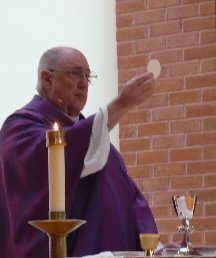 We are called to die to sin and
lift our very selves to God so that we become changed; to do as God would have
us do, to become what God would have us become. Our own little cross can
lift us into union with Christ's Cross so we may earn the joys of everlasting
happiness with God the Father.
We are called to die to sin and
lift our very selves to God so that we become changed; to do as God would have
us do, to become what God would have us become. Our own little cross can
lift us into union with Christ's Cross so we may earn the joys of everlasting
happiness with God the Father.
The
Lord's Supper:
Before he was given up to death, a death he freely accepted, he took
bread and gave you thanks. He broke the bread, gave it to his disciples,
and said:
Take this, all of
you and eat of it: this is my Body which will be given up for you.
When
supper was ended, He took the cup. Again he gave you thanks and praise,
gave the cup to his disciples, and said:
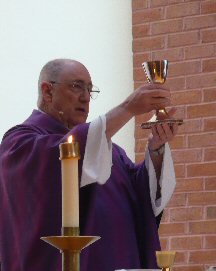 Take this, all of you, and drink from it; for this is the chalice of my
Blood, the Blood of the new and eternal covenant. It will be shed for you
and for all so that sins may be forgiven. Do this in memory of me.
Take this, all of you, and drink from it; for this is the chalice of my
Blood, the Blood of the new and eternal covenant. It will be shed for you
and for all so that sins may be forgiven. Do this in memory of me.
Memorial Acclamation: (The priest may
select from several forms).
Priest: Let us proclaim the mystery of faith:
Priest
and All: When we
eat this Bread and drink this Cup, we proclaim your Death, O Lord, until you
come again.
Memorial Prayer: (The
priest may select from several forms).
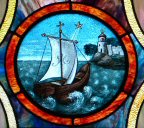 Priest:
Priest:
Recalls Christ's Passion, Resurrection, Ascension, the Church,
the dead, and ourselves.
In memory of His death and resurrection, we offer you, Father, this
life-giving bread, this saving cup. We thank you for counting us worthy to
stand in your presence and serve you. May all of us who share in the body
and blood of Christ be brought together in unity by the Holy Spirit. Lord,
remember your Church throughout the world; make us grow in love, together with
_____ our Pope, _____ our bishop, and all the clergy. Remember our
brothers and sisters who have gone to their rest in the hope of rising again;
bring them and all the departed into the light of your presence. Have
mercy on us all; make us worthy to share eternal life with Mary, the virgin
Mother of God, with the apostles, and with all the saints who have done your
will throughout the ages. May we praise you in union with them, and give
you glory through your Son, Jesus Christ.
Through whom you continue to create all these good things, O Lord; you
make them holy, fill them with life, bless them, and bestow them upon us.
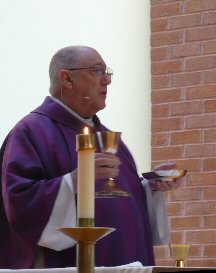 Doxology:
Doxology:
Prayer of Praise: Through
him, with him, and in him, in the unity of the Holy Spirit, all glory and honor
is yours, almighty Father, for ever and ever.
All: Amen.
Communion Rite
In the Liturgy of the Eucharist, we
symbolically offer ourselves to the Lord through the gifts of bread and wine.
At the Consecration, we offer our very lives to be united the God the Father
through the Cross of Christ. In Communion, we find that we have not died
at all, but have come to life. We have surrendered ourselves to God
through His Divine Son, Jesus Christ. In return become ennobled and
enriched. We give up time and we get eternity, we give up our sin and we
receive grace, we surrender our self-will and receive the strength of the Divine
Will, we give up ourselves and we receive everything. For the Son of God
says to us that unless we receive Him we shall not have Divine life in us.
But it is not really we who receive Christ as it is Christ who receives us,
bringing us into Himself.
God makes His Cross the very means
of our salvation and our life. While we have crucified Him, His eternal
love cannot be extinguished. Christ willed to give us the very life we
crucified in our Redemption, the Consecration of Holy Thursday into Communion,
His death into our everlasting life.
The Lord's
Prayer:
Priest:
Let us pray for the coming of the kingdom as Jesus taught us.
Priest and
All: Our
Father, who art in heaven, hallowed be they name; Thy kingdom come; Thy will be
done on earth as it is in
heaven. Give us this
day our daily bread; and forgive us our trespasses as we forgive those who
trespass against us; and lead us not into temptation, but deliver us from evil.
Priest: Deliver us, Lord, from every evil, and grant us peace
in our day. In your mercy keep us free from sin and protect us from all
anxiety as we wait in joyful hope for the coming of our Savior, Jesus Christ.
All: For the
kingdom, the power and the glory are yours, now and for ever.
Prayer for
Peace:
Priest: Lord Jesus Christ, you said to your apostles,
peace I leave you, my peace I give you, look not on our sins, but on the faith
of your Church, and graciously grant the peace and unity of your kingdom where
you live for ever and ever.
All: Amen.
Priest: The peace of the Lord be with you always.
All: And with your spirit.
Priest: Let us offer each other the sign of peace.
Breaking of the Bread:
Priest and All: Lamb of God, you take away the sins of the
world, have mercy on us.
Lamb of God, you take away the sins of the world, have mercy on us.
Lamb of God, you take away the sins of the world, grant us peace.
Priest: May this mingling of
the Body and Blood of our Lord Jesus Christ bring eternal life to us who receive
it.
Communion of the Priest:
Priestly Preparation: Lord Jesus Christ, Son of the living God, who by the will of the Father and the
work of the Holy Spirit, through
your death gave life to the world; free me by this your most holy Body and Blood
from all my sins and from every evil; keep me always faithful to your commandments, and never let me be
parted from you.
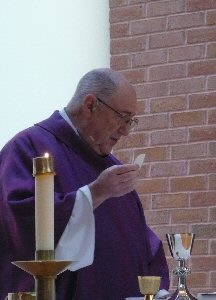 Priest: This is the Lamb of God who takes away the sins of the world. Happy are
those who are called to his supper.
Priest: This is the Lamb of God who takes away the sins of the world. Happy are
those who are called to his supper.
Priest and All: Lord,
I am not worthy to receive you, but only say the word and I shall be healed.
Priest: May the Body of Christ keep me safe for eternal life.
May the Blood of Christ keep me safe for eternal life.
Communion Antiphon:
Communion Song: Matthew 26:42
Father, if this chalice cannot pass without my drinking it, your will be
done.
Communion of the Faithful:
Priest:
The Body of Christ.
The Faithful: Amen.
Priest:
The Blood of Christ.
The Faithful: Amen.
Cleansing of the Vessels:
Priest: Lord, may I receive these gifts in purity of heart.
May they bring me healing and strength, now and for ever.
Prayer after Communion:
Priest: Let us pray.
Priest: Nourished
with these sacred gifts, we humbly beseech you, O Lord, that, just as through
the death of your Son you have brought us to hope for what we believe, so by his
Resurrection you may lead us to where you call. Through Christ our Lord.
Concluding Rite
Priest: The Lord be with you.
All: And also with you.
Priest: Bow your heads and let us pray for God's blessing.
Dismissal Prayer: (The priest may select
from several forms)
Priest:
Look, we pray, O Lord, on this your family, for whom our Lord Jesus
Christ did not hesitate to be delivered into the hands of the wicked and submit
to the agony of the Cross. Who lives and reigns for ever and ever.
All: Amen.
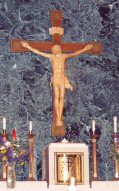
O
my Jesus, forgive us our sins.
Save us from the fires of hell.
Lead all souls to heaven,
especially those in most need of your mercy.
www.Divinemasterplanforlife.com
www.Saintsnheaven.com
Top
Home Page
Liturgical
Year Cycle A 13-14
 The Gospel:
The Liturgy of the Word is completed
by the reading of the Gospel. Before its reading, the members of the
assembly trace the sign of the cross upon the forehead to indicate their mental
acceptance of the Truth, on the lips to indicate their readiness to announce it,
and over the heart to indicate their sincere desire to accept it into their
lives. The "Good News" of the Gospel tells that God's kingdom has come for
all to hear, accept, and announce to the world for its salvation. It
is God who is speaking to us. Christ comes to teach us by the example of
His life and by His own words.
The Gospel:
The Liturgy of the Word is completed
by the reading of the Gospel. Before its reading, the members of the
assembly trace the sign of the cross upon the forehead to indicate their mental
acceptance of the Truth, on the lips to indicate their readiness to announce it,
and over the heart to indicate their sincere desire to accept it into their
lives. The "Good News" of the Gospel tells that God's kingdom has come for
all to hear, accept, and announce to the world for its salvation. It
is God who is speaking to us. Christ comes to teach us by the example of
His life and by His own words.

 Narrator: While they were eating, Jesus took bread, said the
blessing, broke it, and giving it to his disciples said,
Narrator: While they were eating, Jesus took bread, said the
blessing, broke it, and giving it to his disciples said, Narrator: When he returned to his disciples he found
them asleep. He said to Peter,
Narrator: When he returned to his disciples he found
them asleep. He said to Peter, Narrator: Now Jesus stood before the
governor, and he questioned him,
Narrator: Now Jesus stood before the
governor, and he questioned him, Narrator: They spat upon him and took the reed
ad kept striking him on the head. And when they had mocked him, they stripped
him of the cloak, dressed him in his own clothes, and led him off to crucify
him. As they were going out, they met a Cyrenian named Simon: this man they
pressed into service to carry his cross. And when they came to a place called
Golgotha which means Place of the Skull they gave Jesus wine to drink mixed
with gall. But when he had tasted it, he refused to drink. After they had
crucified him, they divided his garments bv casting lots; then they sat down and
kept watch over him there. And they placed over his head the written charge
against him: This is Jesus, the King of the Jews. Two revolutionaries were
crucified with him, one on his right and the other on his left. Those passing
by reviled him, shaking their heads and saying,
Narrator: They spat upon him and took the reed
ad kept striking him on the head. And when they had mocked him, they stripped
him of the cloak, dressed him in his own clothes, and led him off to crucify
him. As they were going out, they met a Cyrenian named Simon: this man they
pressed into service to carry his cross. And when they came to a place called
Golgotha which means Place of the Skull they gave Jesus wine to drink mixed
with gall. But when he had tasted it, he refused to drink. After they had
crucified him, they divided his garments bv casting lots; then they sat down and
kept watch over him there. And they placed over his head the written charge
against him: This is Jesus, the King of the Jews. Two revolutionaries were
crucified with him, one on his right and the other on his left. Those passing
by reviled him, shaking their heads and saying, Narrator: There were many women there, looking
on from a distance, who had followed Jesus from Galilee, ministering to him.
Among them were Mary Magdalene and Mary the mother of James and Joseph, and the
mother of the sons of Zebedee. When it was evening, there came a rich man from
Arimathea named Joseph, who was himself a disciple of Jesus. He went to Pilate
and asked for the body of Jesus; then Pilate ordered it to be handed over.
Taking the body, Joseph wrapped it in clean linen and laid it in his new tomb
that he had hewn in the rock. Then he rolled a huge stone across the entrance
to the tomb and departed. But Mary Magdalene and the other Mary remained
sitting there, facing the tomb. The next day, the one following the day of
preparation, the chief priests and the Pharisees gathered before Pilate and
said,
Narrator: There were many women there, looking
on from a distance, who had followed Jesus from Galilee, ministering to him.
Among them were Mary Magdalene and Mary the mother of James and Joseph, and the
mother of the sons of Zebedee. When it was evening, there came a rich man from
Arimathea named Joseph, who was himself a disciple of Jesus. He went to Pilate
and asked for the body of Jesus; then Pilate ordered it to be handed over.
Taking the body, Joseph wrapped it in clean linen and laid it in his new tomb
that he had hewn in the rock. Then he rolled a huge stone across the entrance
to the tomb and departed. But Mary Magdalene and the other Mary remained
sitting there, facing the tomb. The next day, the one following the day of
preparation, the chief priests and the Pharisees gathered before Pilate and
said, The Liturgy of the Eucharist
The Liturgy of the Eucharist We are called to die to sin and
lift our very selves to God so that we become changed; to do as God would have
us do, to become what God would have us become. Our own little cross can
lift us into union with Christ's Cross so we may earn the joys of everlasting
happiness with God the Father.
We are called to die to sin and
lift our very selves to God so that we become changed; to do as God would have
us do, to become what God would have us become. Our own little cross can
lift us into union with Christ's Cross so we may earn the joys of everlasting
happiness with God the Father.
 Take this, all of you, and drink from it; for this is the chalice of my
Blood, the Blood of the new and eternal covenant. It will be shed for you
and for all so that sins may be forgiven. Do this in memory of me.
Take this, all of you, and drink from it; for this is the chalice of my
Blood, the Blood of the new and eternal covenant. It will be shed for you
and for all so that sins may be forgiven. Do this in memory of me. Priest:
Priest:  Doxology:
Doxology:  Priest: This is the Lamb of God who takes away the sins of the world. Happy are
those who are called to his supper.
Priest: This is the Lamb of God who takes away the sins of the world. Happy are
those who are called to his supper. 